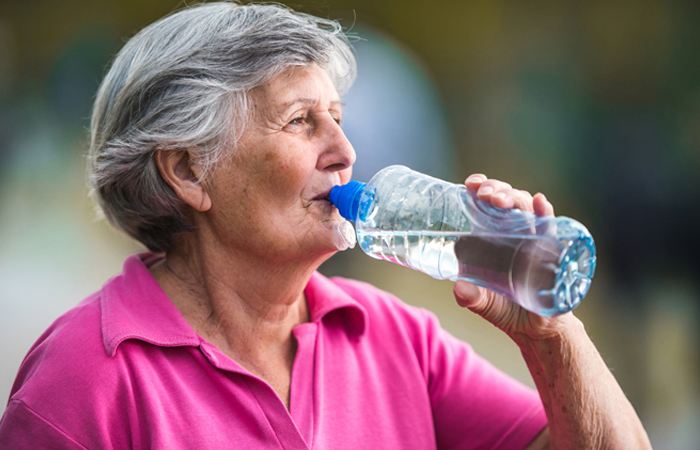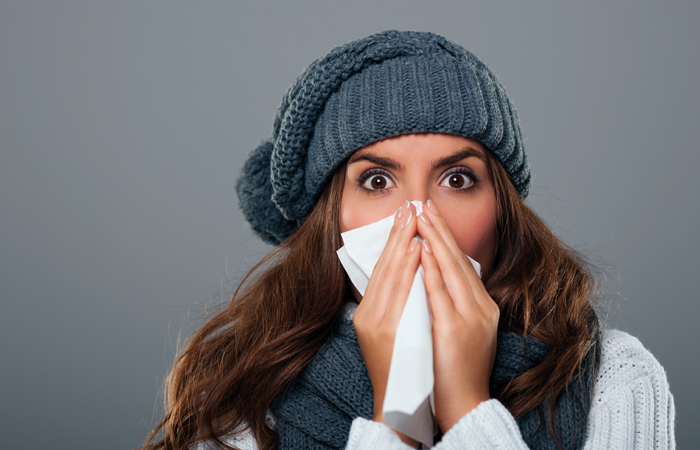The cold hard facts
In Conditions
Follow this topic
Bookmark
Record learning outcomes
Every winter runny noses, coughs and congestion threaten to take out every man, woman and child. So how can pharmacy teams help customers take preventative steps to stop a dreaded cold setting in?
It’s that time of year: colds are lurking around every corner and no one is safe from the snotty symptoms. Or are they?
While colds are certainly widespread, particularly as the weather gets colder, they’re by no means inevitable. In fact, there are many preventative measures that pharmacy staff can recommend to customers to help ward off the bugs. The trick is to think healthy.
Put simply, healthy bodies have an easier time fighting infection. “If people are overdoing it, not getting enough sleep, have a poor diet, are overdoing the alcohol and smoking, they’re more prone to infection,” says Graham Philips, pharmacist proprietor at Manor Pharmacy Group. “The more you can optimise health and the microbiome, the more resilient you’ll be,” adds Graham.
So what advice should pharmacy staff have in their arsenal to help customers dodge coughs and colds this winter?
1. Eat healthily
A healthy, balanced diet provides essential nutrients, such as vitamins, minerals and fibre, to keep the immune system in tip top condition. It won't neccessarily prevent people picking up colds and flu but it can help to better protect them and speed up recovery.
Based on World Health Organization guidance, it is recommended that everyone in the UK should eat five portions of fruit and vegetables per day. This can include fresh, frozen, tinned, dried or juiced fruit and veg as well as beans and pulses. When it comes to portion size matters. As a rough guide, portions of fruit and vegetables are 80g of fresh, 30g of dried and 150ml of juice or smoothie. And variety is just as important.
Sian Porter, consultant dietitian and spokesperson for the British Dietetic Association, says: “No one food has all the nutrients you need so it’s a good idea to ‘eat a rainbow’ and include brightly coloured [fruit and vegetables] like red peppers and oranges as these are great source of vitamins and phytonutrients (health promoting compounds found in plants) like beta-carotene that can help keep your immune system working well.”
Sian also recommends eating plenty of protein as this helps the body fight fatigue and build antibodies to
fight infection, as well as probiotics. These “friendly bacteria”, found in fermented foods like live bio-yoghurt and kefir, are thought to help restore the natural balance of bacteria in the gut and, as Sian says, “a healthy gut is important in immune function”.
The Eatwell Guide from Public Health England (PHE) shows a breakdown of a healthy, balanced diet and how much of each food group everyone should be eating.

2. Cut down on sugar and refined foods
Although it can be difficult once the nights start drawing in, resisting the urge to comfort eat is important. These foods are often quite high in fat and sugar, neither of which are conducive to staving off infection, as they make the gut unhealthy and cause inflammation in the body, compromising the immune system.
"Often if a diet is high in processed and sugary foods then the nutrient quality of the diet can be low and these foods [are often] being eaten instead of healthier snack choices like a piece of fruit," Sian adds. As well as eating a variety of fruits and vegetables, variety across the whole diet is key as it provides the gut with all the nutrients it needs to thrive.
3. Stay hydrated
As part of the Eatwell Guide, PHE recommends people aim to have the equivalent of six to eight glasses of fluid a day. Water, lower fat milk and sugar-free drinks including tea and coffee all count, although fruit juice and smoothies should be limited to 150ml per day due to their high sugar content.
“Getting enough fluid is essential to moisten the lining of the respiratory tract,” explains Sian. “This helps to prevent dehydration which results in tiny cracks forming in the nasal membranes allowing viruses to enter into the body.
Advice should also include cutting down on alcohol consumption, if necessary, to within the recommended limits as “research suggests alcohol suppresses the immune system and can dehydrate you,” Sian adds. Both men and women should be drinking no more than 14 units per week, spread out evenly over three or more days and with at least two alcohol-free days.

4. Eat more garlic
Garlic has long been believed to have a potent effect when it comes to preventing the common cold, due to its supposed strong antiviral, antimicrobial, antioxidant and antibacterial properties. Sian explains that while garlic has demonstrated these effects, it has been in “few high-quality human studies”. She explains:
“Some have shown positive effects but this is taking supplements with high doses of extract and are correlation rather than effect – i.e. people who eat garlic to take garlic supplements may be better nourished and have healthier lifestyles than those that don’t, so get sick less for this reason.”
Not enough strong evidence means that while garlic may be good for warding off vampires, it’s probably less useful for preventing a cold.
5. Vitamins and minerals
It’s well documented that a diet rich in nutrients is beneficial for the immune system, but what role do vitamin and mineral supplements have in cold prevention?
Vitamin C has a strong reputation as a preventative measure for colds, with drinking plenty of orange juice being many people’s go-to solution. But it won’t do the job alone and, as Sian explains, it doesn’t necessarily help with prevention.
“Studies have shown taking vitamin C can reduce the length of a cold once you have it but not stop you getting one, other than the fact that adequate vitamin C intake is important for a healthy immune system and healthy skin,” Sian says. That said, vitamin C is an important part of a healthy diet and eating rich sources such as peppers, strawberries, kiwi fruit, oranges and broccoli should be recommended.
Laboratory studies have found that zinc can inhibit the replication of the rhinovirus, which is the most frequent cause of cold symptoms and so it’s become a popular prevention measure and treatment. “Zinc, which is found in fish, shellfish, lean meat, poultry, eggs, milk, whole grains, nuts, seeds, and Quorn is important for colds,” she says. “Some studies have shown zinc lozenges can shorten duration of colds but can have side effects so it’s best to get [zinc] from [the] diet.”
6. Echinacea
There is some evidence to support the role of Echinacea in the prevention and treatment of colds but results of studies are mixed so it’s difficult to say with any certainty whether it works. Graham says: “The evidence isn’t outstanding but I would recommend Echinacea. I think it can work well and you need a good dose of a good brand.” Sian adds that “some people may be allergic to it or suffer side effects and it can react with certain drugs” so asking appropriate questions and double checking with a pharmacist is important.
7. Get up an about
Exercising regularly is beneficial as it means people are less likely to get upper respiratory tract infections or if they do succumb to one, symptoms are usually less severe. This is because regular exercise allows improvement of overall fitness, which can help to boost the immune system and the body’s defence against infections.
The Government recommends that adults should aim for 150 minutes of moderate intensity exercise or 75 minutes of vigorous intensity exercise per week.

8. Sleep more, stress less
The immune system works best when the body is well rested and a prolonged lack of sleep can disrupt the immune system so a person is less able to fend off bugs. A 2015 study published in the journal Sleep found that those who slept less than five hours a night were four-and-a-half times more likely to catch a cold than those sleeping more than seven hours.
Just like a lack of sleep, stress can take its toll on the body and immune system and these two factors are often connected: feeling stressed can mean not sleeping well enough, and a lack of sleep can cause further stress.
Getting enough quality sleep and factoring in time to switch off and relax is therefore key. The average adult needs seven to nine hours of sleep per night and advice such as keeping electronic devices out of the bedroom, maintaining a comfortable and relaxing sleeping environment that’s not too hot, cold, noisy or bright and avoiding caffeine, nicotine and alcohol late at night can all be recommended.
9. Mother knows best
Washing your hands is one of the easiest ways to stay protected from cold and flu viruses. They can survive on surfaces for anything between a few minutes and 24 hours so it’s important to wash hands regularly, especially before touching the nose or mouth and before handling food, to avoid contamination.
According to NHS Choices, washing hands properly should take about as long as singing "Happy Birthday" twice, or around 20 seconds. Everyone should be advised to use luke warm water and soap, paying particular attention to the skin between fingers, under fingernails and around rings.
10. Flu vaccination
The best way to prevent flu is to be vaccinated every year before the flu season starts in December, especially for at risk groups such as people aged 65 and over, pregnant women, those who have certain long-term conditions or are the main carer for an elderly or disabled person whose a welfare may be at risk if they fall ill.
Although it isn't 100 percent effective, people who have the vaccine are likely to experience milder symptoms than if they hadn't been vaccinated.
Some people worry that the jab itself could cause flu, but this is not the case, as it doesn’t contain live viruses. However there may be some side effects, such as a temperature and aching muscles, for a day or two after vaccination, which can be managed with OTC pain relief if necessary.

If the worst comes to the worst...
Despite everyone’s best efforts, many will succumb to a cold at least once throughout the winter period and that means a lot of potential business for pharmacy. While cold and flu remedies don’t help fight infection, they can offer relief from symptoms and there’s a whole host of advice and recommendations that can be passed onto customers.
“It’s all about symptomatic treatment and it certainly depends if it’s a cold or if it’s man flu,” Graham remarks. “For a runny nose or congestion you can recommend decongestant tablets or a nasal spray, but beware of interactions and rebound congestion with the sprays. And if they’ve got a sore throat you can suggest lozenges with an anaesthetic or anti-inflammatory action.”
Graham also suggests: “Paracetamol if people are feeling grotty, although some people prefer ibuprofen which has an anti-inflammatory effect too. If symptoms are particularly severe then they can take a combination of paracetamol and ibuprofen. There are combination products available but I would recommend people alternate the two.”
When recommending ibuprofen, it’s important to be aware of prescription interactions, as well as if people have asthma, gastrointestinal problems, inflammatory bowel conditions or a history of stomach ulcers.
Stay well this winter
Public Health England's Stay Well This Winter campaign aims to ease seasonal pressure on NHS services by ensuring that people who are most at risk of preventable emergency admission to hospital are aware of and motivated to take actions that may avoid admission, where possible.
This involves promoting flu vaccination uptake among at risk groups, including pregnant women, children aged two and three years and those with long-term health conditions, particularly respiratory diseases. It also focuses on prompting those who are at risk of hospital admission to visit the pharmacy for advice and/or treatment for seasonal illnesses.
A tailored approach
Young children get far more colds than adults because their immune system is still developing. It can be quite concerning for parents when their child is unwell but in the majority of cases, colds aren’t serious and normally pass within due course.
While the symptoms are generally similar in adults and children, treatment options are not and this is also the case for certain other patient groups too. “For the under-twos, under- sixes and under-12s there are specific products available because the adult alternatives aren’t suitable,” Graham explains. “You have to tailor the treatment combination to their age, whether they have any long-term medicines or conditions, and you have to be particularly careful with pregnant women.”
Where medicines aren’t the preferred option, Graham also suggests that simple steam inhalation can work very well for young babies. It can also be helpful to: “Clean their nose with simple saline nose drops on cotton wool, or prop their head above their legs in bed so the fluid drains. With any child who is coughing and spluttering, take them into the bathroom and run a warm bath. Don’t put them in it but let them play around it and the moisture in the atmosphere can be soothing,” Graham adds.
Many of the self care tips that can be recommended for preventing a cold are also good practice when managing a cold in adults and children. This includes:
- Get lots of rest
- Drink plenty of fluids
- Eat healthily
- Keep up hygiene, including washing hands regularly and coughing and sneezing into disposable tissues.
Remember
Antibiotics are not prescribed for colds. They won’t relieve symptoms or speed up recovery as they are only effective against bacterial infections and colds are caused by viruses.
While the symptoms are generally similar in adults and children, treatment options are not

